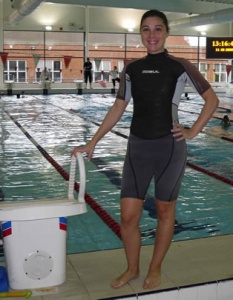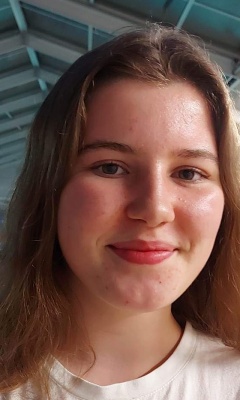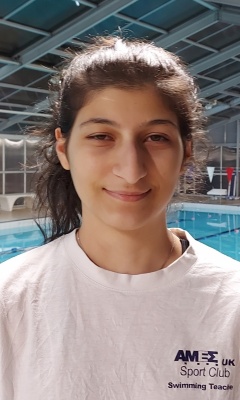Swim England, Child Welfare Complaints Procedure
The Procedure
Step One – Informal Resolution Locally Timescale: Immediate
As a member of the Swim England, when a child, parent or carer
has made a complaint or drawn to your attention a concern, you must
first assess as to whether it is appropriate for you to resolve it.
In general terms if it is minor in its nature and if you are
able to address the concern, you should do so.
Ideally, if at all possible, you should consult your swim school
Welfare Officer, which is allocated by the swim school, before embarking
on any course of action.
Confidentiality must be maintained on a “need to know basis”
i.e. only the coach, the Welfare Officer and child’s parents may need to
know of a concern and no one else.
Sometimes the individuals involved may need to be extended to
the Team Manager (for example a child causing distress to another during
club sessions).
The important factor is to keep the information restricted to as
small a circle as possible.
Step Two – Resolution through Club Welfare Officer Timescale: Intervention 7 Days
The primary role of the swim school Welfare Officer will be to
resolve to the satisfaction of the child, parent, guardian, carer or
anyone else the welfare issues complained of, if at all possible.
A swim school Welfare Officer may have matters referred to them
for example through Step One or may have matters brought directly to
their attention.
The swim school Welfare Officer will consider the nature of the
complaint and if they are able to address the concern.
It is anticipated that swim school Welfare Officer will be able to
address issues such as minor club rule infringements, poor practice and
bullying through the club’s own complaints process.
Guidance and support can be obtained from the Swim England ICPO at
any time.
If the assistance of the Swimm England ICPO is not sought
before the issues are resolved, the concerns and outcomes should be
reported to the Swim England ICPO afterwards.
The swim school Welfare Officer should at all times be mindful
of the support and guidance that can be accessed from the Swim England
ICPO and that concerns to be dealt with by a swim school Welfare
Officer should be child welfare concerns only.
Matters of child protection should be referred, where appropriate,
immediately to the appropriate statutory authority (see 25 The Swim
England Child Welfare Complaints Procedure details in Wavepower –
Welfare Officer’s information sheet) and to the Swim England
ICPO.
The swim school Welfare Officer must:
1. Record the details of the complaint – what was the problem?
2. How it was resolved? The actions taken and by whom (the Welfare Officer or others).
3. Observe confidentiality and secure storage of referral documentation (see appropriate policies within Wavepower).
Step Three – National Level – The Swim England Independent Child Protection Officer Timescale: Intervention 3 Days
The Swim England ICPO will have a right to be involved in any
child welfare matter, which the Swim England ICPO in consultation with
the Director of Regulatory and Legal Affairs reviews and decides needs
Swim Englandintervention. For example:
1. Where one party remains unhappy that the problem has not been resolved at Step One or Step Two.
2. Where a matter is brought to the Swim England ICPO’s
attention by an Swim Engand Welfare Officer at Steps One or Two.
3. At any stage, by direct referral to the Swim England ICPO by
an Swim England member (child or adult), parent, guardian or carer of
an Swim England member.
Within three days of a child welfare complaint being brought to
the attention of the Swim England ICPO consideration will be given to
section 2 (i) of the Protocols For Child Safeguarding Investigations
found in the Swim England Handbook.
The Swim England ICPO will liaise with the club Welfare Officer
to ensure that the club is handling the child welfare issue correctly.
The club Welfare Officer will be responsible for ensuring that the
club follows the Swim England ICPO’s guidance.
It is entirely a matter for the Swim England ICPO as to the level of
involvement and the guidance given.
At any point throughout the Swim England ICPO’s involvement,
the issues will be kept under constant review and a decision may be
taken to:
1. Implement a referral to a statutory agency under section 2
(ii) of the Protocols. For Child Safeguarding Investigations or
2. Appoint an independent investigator to complete a
fact-finding investigation under section 2 (iii) of the Protocols For
Child Safeguarding Investigations or
3. Make a formal complaint under the Swim England Judicial
Regulations under section 2 (iv) of the Protocols For Child Safeguarding
Investigations or
4. Take such action as recommended by the ASA ICPO (e.g. a
direction that an individual be required to submit to a risk assessment
or that the Swim England file a complaint against a club or an
individual).
All swim schools/clubs must note that if the guidance of the
Swim England ICPO is not followed the Swim England ICPO may complete a
report to the Director of Regulatory and Legal Affairs and may recommend
that formal judicial complaint is filed against the club under
Swim England Judicial Regulations.
The basis of a judicial complaint will be that the club has failed to
comply with the required level expected of Swim England clubs in
complying with Swim England Child Safeguarding.
In the case of clubs with Swim 21 accreditation, the Swim England ICPO’s Report may alternatively be submitted to the National Swim 21 Panel recommending removal of Swim 21 accredited status, the basis of the recommendation being that the club has not met its requirements under Swim England child safeguarding.
The above timescale provides an indication that within three days of being notified of a child welfare issue, the Swim England ICPO will decide the level of his/her involvement and will inform all parties accordingly. The Swim England ICPO will have the child’s welfare as the main concern and will try to resolve the issues with that main concern in mind. As a guide the Swim England ICPO will try to achieve a successful resolution or to decide other appropriate action or to have concluded and closed the file within three months of the original referral.
Where a three month conclusion is not possible, e.g. because of the involvement of a statutory agency, the Swim England ICPO will seek to keep the child (through their parent, guardian or carer) informed of progress being made.
No Appeal
The Swim England ICPO’s final report as to the steps taken,
closing the file and/or recommendation as to alternative action is
final.
In the case of a decision being taken under Swim England Child
Protection Regulations 241 et al there shall be a right of appeal to the
Independent Disciplinary and Dispute Resolution Appeals Panel against a
decision of the Chief Executive.
Note
Failure to comply with this procedure may
result in a recommendation from the Swim England ICPO that a club is
not meeting its obligations under child safeguarding.
This may result in a formal complaint or other action being taken
under Swim England Child Safeguarding Regulations 241 et al.
Any action complained of under the Child Welfare Complaint
Procedure may amount to a breach of ASA Laws and Regulations or of the
Swim England Code of Ethics.
Any Swim England member may bring a complaint under the Judicial
Regulations against an Swim England member.
It is therefore possible for a child welfare concern to amount to a
breach of Swim England Laws and Regulations or of the Code of Ethics and
for a judicial complaint to be filed for the same set of circumstances.
It is a matter for the individual member as to whether or not
they wish to file a judicial complaint whilst a matter is being dealt
with under the Child Welfare Complaints Procedure.
Where a judicial complaint is filed and a Child Welfare Complaint is
also filed, the child welfare matter will take precedence.
This procedure is subject to continuous review and amendment as
best practice evolves and accordingly the Swim England reserves the
right in particular cases to depart from the above and, accordingly,
procedures where it is deemed to be appropriate by the Swim
England ICPO in consultation with the Swim England Director of
Regulatory and Legal Affairs.
November 2017
Published July 2017 (to be reviewed July 2019)







